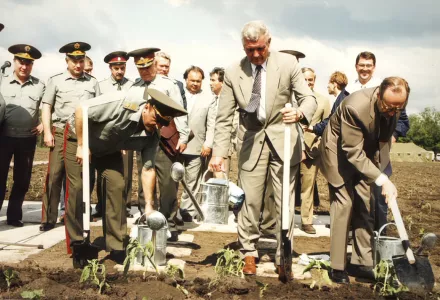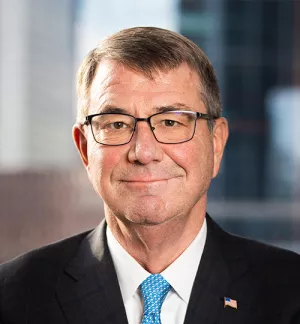
Ambassador George Krol (ret.) recounts Ash Carter's seminal role with newly independent republics of former Soviet Union in the mid-1990s.
Like many who knew Ash Carter, I was shocked and deeply saddened to hear of his sudden and untimely passing. Although our paths had not crossed for many years, I will never forget the pivotal role he played in the early days of formulating and implementing U.S. foreign policy toward the newly independent states of the former Soviet Union.
At the time – 1995-1997 – I was the Special Assistant to the State Department’s Ambassador-at-Large for the Newly Independent States, Ambassador Jim Collins. I assumed that role after serving several years in our new embassies in Ukraine and Belarus where I was a bit-player in the negotiations that led to the withdrawal of strategic nuclear weapons from those two countries and Kazakhstan and their accession to the Nuclear Non-Proliferation Treaty as non-nuclear states. Ash Carter, then Assistant Secretary of Defense for International Policy, and his boss, Defense Secretary Bill Perry, were among the key strategic thinkers and negotiators in achieving that historic deal which many thought would make the world a safer place. And it did.
When I started my Washington assignment with Jim Collins, one of my key tasks was coordinating policy positions and trips with colleagues in the Defense Department, most directly with Ash Carter’s office. I was present at many discussions between my boss and Ash Carter and his staff. Rarely have I witnessed greater interagency cooperation and effective brainstorming. Ash Carter had assembled a talented team in his office – he assessed people well and was always able to get the most out of everyone around the table with his inquisitive mind, diverse knowledge of science and politics and his inveterate politeness.
Ash demonstrated great intellect, while at the same time exhibiting little ego – a rarity for many working in the Washington policy bubble. He asked hard questions of himself and others but was never condescending or dismissive. He clearly emulated Secretary Perry, who reflected these same characteristics at the discussion table. Carter and Perry were a perfect team in practically all respects. Perry too knew quality when it came to people.
In addition to seeing Ash in action in the Washington venue, I had the opportunity to travel with him on our “parish visits” to the states of the former USSR. In those days getting around the former USSR was a challenge. Most air, rail, and road transportation among the states had been disrupted. Few if any international air carriers serviced the region. You took your life in your hands flying on the local airlines that often were grounded with fuel shortages and mechanical problems. The only way to get around safely and efficiently was by dedicated U.S. Government aircraft, and here only the Pentagon had that asset in relative abundance. The State Department, as well as the White House and most other agencies, relied on the Defense Department for transport and it was costly, unless the delegation was led by a Defense Department official senior enough to merit a dedicated plane. Ash had the enviable position of being such an official, and he was exceedingly generous in leading interagency delegations to our region.
Ash did this not just to show solidarity with the rest of his colleagues in the U.S. Government, but because he and Secretary Perry recognized the strategic value of engaging the new governments directly and on their turf. There was nothing like seeing a U.S. Air Force plane emblazoned with the U.S. flag landing on the tarmac in one of these far-off capitals – a sign to the governments of these new states that America respected them. On these trips, although technically leader of the delegation because of the plane, Ash nevertheless gave full protocol respect to my boss Jim Collins and the senior officers of other agencies who often joined these trips.
In the meetings with senior government leaders, Ash acted the same as in Washington: he listened, he sought understanding, he persuaded, and he challenged his counterparts effectively and politely. I admired how well he could interact with the various personalities in our garden patch – from the likes of Boris Yeltsin, Heydar Aliyev, and Leonid Kravchuk to Nursultan Nazarbayev, Emomali Rahmon and especially the irascible Islom Karimov of Uzbekistan. Ash made a positive impression on all these interlocuters. Years later, when I was ambassador to Uzbekistan and Kazakhstan, and even Belarus, my interlocuters referred to Ash Carter as representing the golden age in their respective security relationships with the U.S. Even the normally dour Karimov smiled warmly when speaking of Ash.
Ash never shied away from eating the local food, wearing the gifted garb, joining in a dance, or witnessing a parachute drop in the middle of nowhere. The only time I saw him worry was when our plane – “his” plane – was corkscrewing its way to land in war-torn Dushanbe. Ash knew instinctively that showing up in these places at that time was what we needed to do for U.S. policy to be relevant. I would contend much of what remains today of U.S. credibility in the region is thanks in good measure to the work, dedication, and leadership of Ash Carter in those days.
In the end, Ash Carter was always a teacher. His forays into government were the product of his innate dedication to public service. He taught me as a junior government bureaucrat the value of people coming into government from the outside, bringing fresh perspectives and challenging the status quo – something that makes the U.S. system, for all its flaws, stand out and sometimes succeed.
Ash, you left us and America too early, but what you contributed to our public, defense, and foreign policies, and to the destinies of many of those republics that emerged from the Soviet Union, is the achievement of many lifetimes. The world will miss you. We will miss you. I will never forget you and the lessons you taught me along with many others. May you rest in peace.
Krol, George A.. “In Memoriam: Ash Carter's Critical Role in Nuclear Security and Policy.” Belfer Center for Science and International Affairs, Harvard Kennedy School, November 5, 2022


